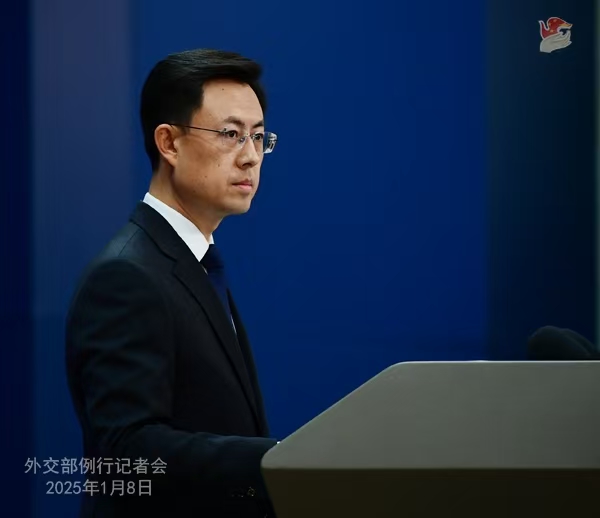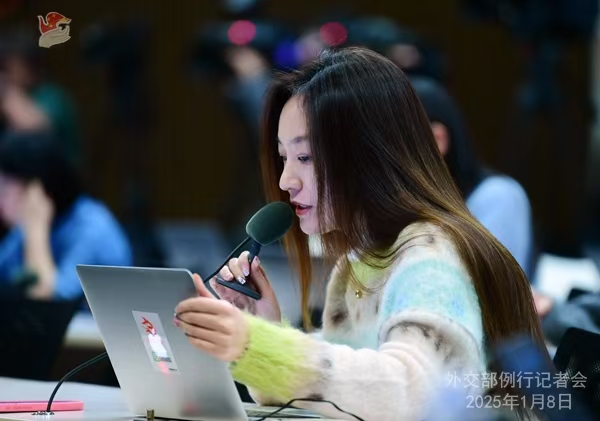

CCTV: A 6.8-magnitude earthquake hit Dingri County in the city of Rikaze in Xizang yesterday. Can you update us on China’s disaster relief efforts?
Guo Jiakun: In the wake of the earthquake, General Secretary Xi Jinping instructed that every effort be made to search for and rescue survivors and treat the injured, minimize fatalities, prevent secondary disasters, look after those who are affected, and make proper arrangements as necessary. He also instructed that steps be taken to enhance quake monitoring and early warning, swiftly allocate rescue and relief supplies, repair damaged infrastructure without delay, make sure people’s basic needs are taken care of and make sure they stay safe and warm for the rest of the winter. Premier Li Qiang also gave instructions on all-out disaster response and relief effort and minimizing fatalities. Yesterday, Vice Premier Zhang Guoqing led a group made up of officials from competent authorities to the quake-hit region to guide the rescue, relief and related work.
Relevant authorities of the Chinese government have launched a level-II emergency service response and the disaster response and relief work is proceeding in a timely and orderly way. As we speak, the first batch of relief supplies sent by the central government has arrived in the quake-hit region; all roads damaged by the earthquake in Dingri County have been repaired and able to be open to traffic; power has been restored to the county center and multiple towns and villages of Dingri County; and telecommunication has been restored in the region affected by the disaster. We believe that under the strong leadership of the CPC Central Committee, the people there will overcome the disaster and rebuild their homes.
Xinhua News Agency: According to reports, leaders of many countries and international organizations have extended condolences to China over the earthquake. Could you share more information on that?
Guo Jiakun: Since the 6.8-magnitude earthquake jolted Dingri County in Rikaze of Xizang Autonomous Region on January 7, many countries and international organizations have extended condolences to China in various ways.
As of 11 a.m. today, the Chinese side has received messages of condolence in various forms from leaders of 22 countries including Russia, Pakistan, Nepal, Kyrgyzstan, Kazakhstan, Tajikistan, Viet Nam, Malaysia, the Maldives, Japan, Cuba, Venezuela, Serbia, Belarus, Spain, Italy, Azerbaijan, Georgia, Oman, Grenada, El Salvador, and Uzbekistan, foreign ministries of countries including India, Brazil, Egypt, the United Arab Emirates (UAE), Türkiye, Bahrain and Iran, and UN Secretary-General António Guterres, Secretary-General of the Shanghai Cooperation Organization (SCO) Nurlan Yermekbayev and President of the Central American Parliament (PARLACEN) Carlos Hernández. We express sincere appreciation for that.
Reuters: Reuters learned that Chinese EV producer BYD has brought hundreds of Chinese workers on irregular visas to build its factory in Brazil. Sources said BYD has pledged to comply with local labor laws. Does the Foreign Ministry have any updates on how this issue is being worked out?
Guo Jiakun: As we’ve stressed more than once, the Chinese government attaches great importance to protecting the lawful rights and interests of workers and has all along asked our companies to abide by laws and regulations in their operation. China stands ready to continue working with Brazil under the principle of equality, mutual benefit and win-win cooperation to further enhance exchanges and cooperation in various fields.
Dragon TV: We noted that when media outlets of countries around the world review the year 2024, what China has achieved in connectivity cooperation received wide attention. Many believe that the new transport models of “China-Laos Railway plus China-Europe Railway Express” and “China-Laos Railway plus the new western land-sea corridor train service” have become new engines driving regional economic growth. Can you give us more details?
Guo Jiakun: We’ve heard good news recently about connectivity cooperation between China and relevant countries. The China-Europe Railway Express has run over 100,000 trips in total, the total cargo throughput of the China-Laos Railway has exceeded 50 million tonnes, the new western land-sea corridor train service has run over 10,000 trips in the whole year for the first time, the China-Europe Trans-Caspian Express was officially launched, the construction of the China-Kyrgyzstan-Uzbekistan railway has started, priority projects such as the China-Viet Nam cross-border railway and Malaysia’s East Coast Rail Link have made important progress, and the first ever two-way voyage between Chancay and Shanghai through the new land-sea corridor between China and Latin America has been completed. China has become an important driving force for global connectivity.
Connectivity is one of the important cooperation areas under the China-proposed Belt and Road Initiative and meets the Global South’s aspiration for “empowering development.” China last week unveiled 15 measures aimed at advancing large-scale development of the western region, and the country will take synergized efforts in building an international logistics corridor to forge an all-round opening up paradigm at a faster pace that connects China and the world through land and sea as well as the eastern and western regions of the nation. We will uphold the principle of extensive consultation and joint contribution for shared benefit, expand new space for win-win development at a higher level and with greater resilience and sustainability, share with the world opportunities and dividends with China’s high-quality development and high-standard opening up, and help Global South countries realize modernization.
Reuters: It’s said that the Shandong Port Group has banned US-sanctioned tankers from calling into its ports. The ban is expected to drive up shipping costs for independent refiners in Shandong, who are the main buyers of discounted sanctioned crude from Iran, Russia and Venezuela. Could the Ministry share a comment on this?
Guo Jiakun: I’m not familiar with the specifics. More broadly, let me stress that China stands firmly against the US’s illegal unilateral sanctions and long-arm jurisdiction that have no basis in international law or authorization by the UN Security Council.

http://zw.china-embassy.gov.cn/eng/